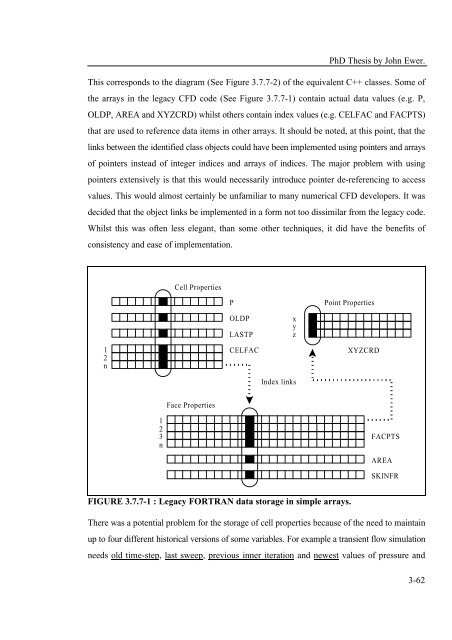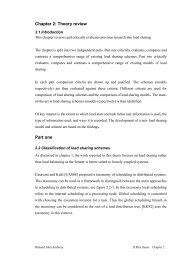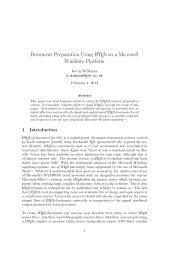- Page 1 and 2:
An investigation into the feasibili
- Page 3 and 4:
PhD Thesis : Contents Sectioniii
- Page 5 and 6:
PhD Thesis : Contents Sectioncompar
- Page 7 and 8:
PhD Thesis : Contents SectionTable
- Page 9 and 10:
PhD Thesis : Contents Sectionincrem
- Page 11 and 12:
PhD Thesis : Contents Section3.8 ST
- Page 13 and 14:
PhD Thesis : Contents Section7.2.3
- Page 15 and 16:
PhD Thesis : Contents Sectionxv
- Page 17 and 18:
PhD Thesis by John Ewer.analysis or
- Page 19 and 20:
PhD Thesis by John Ewer.computation
- Page 21 and 22:
PhD Thesis by John Ewer.that consti
- Page 23 and 24:
PhD Thesis by John Ewer.1.3.2.5 Val
- Page 25 and 26: PhD Thesis by John Ewer.1.4.3 Inves
- Page 27 and 28: PhD Thesis by John Ewer.A more ambi
- Page 29 and 30: PhD Thesis by John Ewer.2 Backgroun
- Page 31 and 32: PhD Thesis by John Ewer.The figure
- Page 33 and 34: PhD Thesis by John Ewer.GUI system.
- Page 35 and 36: 2.4.1 Develop a new CFD engine from
- Page 37 and 38: PhD Thesis by John Ewer.take consid
- Page 39 and 40: PhD Thesis by John Ewer.the CFD dev
- Page 41 and 42: PhD Thesis by John Ewer.nature of t
- Page 43 and 44: PhD Thesis by John Ewer.availabilit
- Page 45 and 46: PhD Thesis by John Ewer.operating s
- Page 47 and 48: PhD Thesis by John Ewer.design. Any
- Page 49 and 50: PhD Thesis by John Ewer.subsequent
- Page 51 and 52: PhD Thesis by John Ewer.3.4.4 Use a
- Page 53 and 54: PhD Thesis by John Ewer.3.4.9 Integ
- Page 55 and 56: PhD Thesis by John Ewer.before the
- Page 57 and 58: PhD Thesis by John Ewer.at the time
- Page 59 and 60: PhD Thesis by John Ewer.3.6.2 Data
- Page 61 and 62: PhD Thesis by John Ewer.3.6.3 Struc
- Page 63 and 64: PhD Thesis by John Ewer.SUBROUTINE
- Page 65 and 66: PhD Thesis by John Ewer.(1:DIMENSIO
- Page 67 and 68: PhD Thesis by John Ewer.regression
- Page 69 and 70: PhD Thesis by John Ewer.some instan
- Page 71 and 72: PhD Thesis by John Ewer.3.7.3 Stage
- Page 73 and 74: PhD Thesis by John Ewer.sometimes r
- Page 75: PhD Thesis by John Ewer.limitations
- Page 79 and 80: PhD Thesis by John Ewer.3.7.8 Stage
- Page 81 and 82: PhD Thesis by John Ewer.implementat
- Page 83 and 84: PhD Thesis by John Ewer.- The legac
- Page 85 and 86: PhD Thesis by John Ewer.4 Developme
- Page 87 and 88: PhD Thesis by John Ewer.these benef
- Page 89 and 90: PhD Thesis by John Ewer.4.2.2 HCI d
- Page 91 and 92: PhD Thesis by John Ewer.4.2.3.3 Vis
- Page 93 and 94: PhD Thesis by John Ewer.4.2.3.7 Cho
- Page 95 and 96: PhD Thesis by John Ewer.4.3.4 Addit
- Page 97 and 98: PhD Thesis by John Ewer.is a middle
- Page 99 and 100: PhD Thesis by John Ewer.can be dete
- Page 101 and 102: PhD Thesis by John Ewer.The validat
- Page 103 and 104: PhD Thesis by John Ewer.temperature
- Page 105 and 106: PhD Thesis by John Ewer.6 Research
- Page 107 and 108: PhD Thesis by John Ewer.6.2.1 Inves
- Page 109 and 110: PhD Thesis by John Ewer.satisfactor
- Page 111 and 112: PhD Thesis by John Ewer.to attempt
- Page 113 and 114: PhD Thesis by John Ewer.6.2.3 Inves
- Page 115 and 116: PhD Thesis by John Ewer.have been k
- Page 117 and 118: PhD Thesis by John Ewer.7 Prelimina
- Page 119 and 120: PhD Thesis by John Ewer.The main pu
- Page 121 and 122: PhD Thesis by John Ewer.The impleme
- Page 123 and 124: PhD Thesis by John Ewer.Using the g
- Page 125 and 126: PhD Thesis by John Ewer.fire spread
- Page 127 and 128:
PhD Thesis by John Ewer.FIGURE 7.2.
- Page 129 and 130:
PhD Thesis by John Ewer.groups and
- Page 131 and 132:
PhD Thesis by John Ewer.FIGURE 7.2.
- Page 133 and 134:
PhD Thesis by John Ewer.SOR solvers
- Page 135 and 136:
PhD Thesis by John Ewer.8 Conclusio
- Page 137 and 138:
PhD Thesis by John Ewer.that can be
- Page 139 and 140:
PhD Thesis by John Ewer.There is al
- Page 141 and 142:
PhD Thesis by John Ewer.of the perf
- Page 143 and 144:
PhD Thesis by John Ewer.practitione
- Page 145 and 146:
PhD Thesis by John Ewer.programming
- Page 147 and 148:
PhD Thesis by John Ewer.26. [COBALT
- Page 149 and 150:
PhD Thesis by John Ewer.41. [UPHAM9
- Page 151 and 152:
PhD Thesis by John Ewer.56. [TAYLOR
- Page 153 and 154:
PhD Thesis by John Ewer.70. [NETCFD
- Page 155 and 156:
PhD Thesis by John Ewer.11 Appendic
- Page 157 and 158:
APPENDIX 1 : SMARTFIRE VERIFICATION
- Page 159 and 160:
APPENDIX 1 : SMARTFIRE VERIFICATION
- Page 161 and 162:
APPENDIX 1 : SMARTFIRE VERIFICATION
- Page 163 and 164:
APPENDIX 1 : SMARTFIRE VERIFICATION
- Page 165 and 166:
APPENDIX 1 : SMARTFIRE VERIFICATION
- Page 167 and 168:
APPENDIX 1 : SMARTFIRE VERIFICATION
- Page 169 and 170:
APPENDIX 1 : SMARTFIRE VERIFICATION
- Page 171 and 172:
APPENDIX 1 : SMARTFIRE VERIFICATION
- Page 173 and 174:
APPENDIX 1 : SMARTFIRE VERIFICATION
- Page 175 and 176:
APPENDIX 1 : SMARTFIRE VERIFICATION
- Page 177 and 178:
APPENDIX 1 : SMARTFIRE VERIFICATION
- Page 179 and 180:
APPENDIX 1 : SMARTFIRE VERIFICATION
- Page 181 and 182:
APPENDIX 1 : SMARTFIRE VERIFICATION
- Page 183 and 184:
APPENDIX 1 : SMARTFIRE VERIFICATION
- Page 185 and 186:
APPENDIX 1 : SMARTFIRE VERIFICATION
- Page 187 and 188:
APPENDIX 1 : SMARTFIRE VERIFICATION
- Page 189 and 190:
APPENDIX 1 : SMARTFIRE VERIFICATION
- Page 191 and 192:
APPENDIX 1 : SMARTFIRE VERIFICATION
- Page 193 and 194:
PhD Thesis by John Ewer.11.2 Copy o
- Page 195 and 196:
APPENDIX 2 : Journal Paper "Case St
- Page 197 and 198:
APPENDIX 2 : Journal Paper "Case St
- Page 199 and 200:
APPENDIX 2 : Journal Paper "Case St
- Page 201 and 202:
APPENDIX 2 : Journal Paper "Case St
- Page 203 and 204:
APPENDIX 2 : Journal Paper "Case St
- Page 205 and 206:
APPENDIX 2 : Journal Paper "Case St
- Page 207 and 208:
APPENDIX 2 : Journal Paper "Case St
- Page 209 and 210:
APPENDIX 2 : Journal Paper "Case St
- Page 211 and 212:
APPENDIX 2 : Journal Paper "Case St
- Page 213 and 214:
APPENDIX 2 : Journal Paper "Case St
- Page 215 and 216:
APPENDIX 2 : Journal Paper "Case St
- Page 217 and 218:
APPENDIX 2 : Journal Paper "Case St
- Page 219 and 220:
APPENDIX 2 : Journal Paper "Case St
- Page 221 and 222:
PhD Thesis by John Ewer.11.3 Copy o
- Page 223 and 224:
APPENDIX 3 : Conference Paper "The
- Page 225 and 226:
APPENDIX 3 : Conference Paper "The
- Page 227 and 228:
APPENDIX 3 : Conference Paper "The
- Page 229 and 230:
APPENDIX 3 : Conference Paper "The
- Page 231 and 232:
APPENDIX 3 : Conference Paper "The
- Page 233 and 234:
ACKNOWLEDGEMENTSAPPENDIX 3 : Confer
- Page 235 and 236:
PhD Thesis by John Ewer.11.4 SMARTF
- Page 237 and 238:
APPENDIX 4 : SMARTFIRE TECHNICAL RE
- Page 239 and 240:
APPENDIX 4 : SMARTFIRE TECHNICAL RE
- Page 241 and 242:
APPENDIX 4 : SMARTFIRE TECHNICAL RE
- Page 243 and 244:
APPENDIX 4 : SMARTFIRE TECHNICAL RE
- Page 245 and 246:
APPENDIX 4 : SMARTFIRE TECHNICAL RE
- Page 247 and 248:
APPENDIX 4 : SMARTFIRE TECHNICAL RE
- Page 249 and 250:
APPENDIX 4 : SMARTFIRE TECHNICAL RE
- Page 251 and 252:
APPENDIX 4 : SMARTFIRE TECHNICAL RE
- Page 253 and 254:
APPENDIX 4 : SMARTFIRE TECHNICAL RE
- Page 255 and 256:
APPENDIX 4 : SMARTFIRE TECHNICAL RE
- Page 257 and 258:
APPENDIX 4 : SMARTFIRE TECHNICAL RE
- Page 259 and 260:
PhD Thesis by John Ewer.11.5 DATA D
- Page 261 and 262:
APPENDIX 5 : DATA DICTIONARY FOR GE
- Page 263 and 264:
APPENDIX 5 : DATA DICTIONARY FOR GE
- Page 265 and 266:
APPENDIX 5 : DATA DICTIONARY FOR GE
- Page 267 and 268:
APPENDIX 5 : DATA DICTIONARY FOR GE
- Page 269 and 270:
==> The mid point of the face.Point
- Page 271 and 272:
APPENDIX 5 : DATA DICTIONARY FOR GE
- Page 273 and 274:
APPENDIX 5 : DATA DICTIONARY FOR GE
- Page 275 and 276:
APPENDIX 5 : DATA DICTIONARY FOR GE
- Page 277 and 278:
APPENDIX 5 : DATA DICTIONARY FOR GE
- Page 279 and 280:
APPENDIX 5 : DATA DICTIONARY FOR GE
- Page 281 and 282:
PhD Thesis by John Ewer.11.6 SMARTF
- Page 283 and 284:
APPENDIX 6 : SMARTFIRE CONTROL ARCH
- Page 285 and 286:
APPENDIX 6 : SMARTFIRE CONTROL ARCH
- Page 287 and 288:
APPENDIX 6 : SMARTFIRE CONTROL ARCH
- Page 289:
APPENDIX 6 : SMARTFIRE CONTROL ARCH




